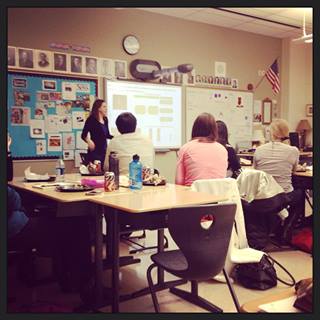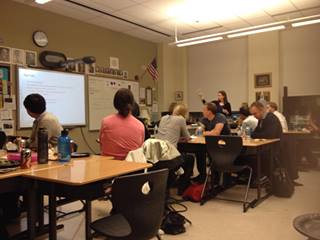Archive for November, 2013
Revive the Dream: Session 2 with Micki O’Neil
 Earlier this week, we hosted the second Revive the Dream seminar. Our Fellows were lucky to spend the evening with charter school founder and former Teaching Fellow, Micki O’Neil.  The issue we discussed, is whether kids in charter schools are better off than kids in traditional public schools.
Earlier this week, we hosted the second Revive the Dream seminar. Our Fellows were lucky to spend the evening with charter school founder and former Teaching Fellow, Micki O’Neil.  The issue we discussed, is whether kids in charter schools are better off than kids in traditional public schools.
The debate is a good one. Some people argue yes, pointing to top charter schools in Chicago, such as KIPP and Noble. Likewise, people also point to the higher average high school graduation rate. On the other hand, there are also others who argue that kids are not better off in charter schools as a whole, arguing that there are more bad charter schools than good ones, that there isn’t enough data to demonstrate college graduation or general success, and that student performance on tests and homework in chartersoften times isn’t any better than their public school counterparts.
About a year ago this panel discussed the issue.  It’s worth the watch if you have an extra hour. The panelists ranged from the President of the Illinois Charter Network (“INCS”), who you might guess was an advocate of the charter system, to a member (or former member) of the Teachers’ Union, to Professors Charles Payne a more neutral voice, from the Unviersity of Chicago.
Thanks to Micki for graciously accepting our invite to visit and talk in more detail about the charter debate as well as discuss her model at the charter school she recently founded, Foundations College Prep.
Here are a few photo shots from the session.
*This is Micki discussing her charter model at Foundations Prep
* This is Micki presenting stats on charter schools versus CPS
Fungal > Viral
 Going viral is what everyone wants their work to do. Â But sometimes fungal can be just as good as viral.
Going viral is what everyone wants their work to do. Â But sometimes fungal can be just as good as viral.
I first heard the idea of “fungal” from one of my heroes, Seth Godin, in one of his sessions at the Startup School. And I think in a lot of cases, the idea is spot on. Think about it.
Going viral is one of the best ways to bring about change. Â Getting millions of people to pay attention to your work. Getting them to come back to your YouTube channel or read your provocative story. Having a voice in the national conversation. Â And having a platform to show the masses an idea that matters.
On the other hand, “fungal” might also be the best option. Â When you’re fungal, your idea doesn’t rely on hitting a tipping point or growing in two days. Â It can also move slowly. Â Person by person. Â And view by view. Â Likewise, it can also work in the dark and keep growing when people are sleeping and spreading drip by drip. Â And then one day everyone will be forced to pay attention because one day you will become the best in the world.
If you have a choice, viral might be the quickest option and most provocative way to create change. Â But sometimes fungal is a much better long-term strategy.
Just a thought.
A few thoughts I shared with Teach for America recruits at the Latino Summit on Saturday
 I dropped by the TFA Offices yesterday to talk to some of the Midwest recruits about leadership and Education Matters.  It’s always great meeting up and coming reformers, and supporting college students in figuring out what to do next and what type of impact they want to have on the world.
I dropped by the TFA Offices yesterday to talk to some of the Midwest recruits about leadership and Education Matters.  It’s always great meeting up and coming reformers, and supporting college students in figuring out what to do next and what type of impact they want to have on the world.
The event was co-organized former TFA core member and current employee Jonathan Chaparro. I originally connected with Jonathan when he shared his story with Education Matters.
I had a lot of good ideas I wanted to share with the group though time was pretty limited. Â During the Q&A portion, one question TFA threw out was “[W]hat is wrong with education and what ideas do you have to fix it? Â This is a pretty big question which makes it hard to narrow down to a few specifics. Â But here are a few of the ideas I remember bringing up to the group.
Flip the classroom to do homework during the day and watch lectures at night. This is the Sal Kahn model, where at night you have access to world class lecturers online for free.  Anyone with an internet connection can find the courses they want and watch them. And the next day (e.g. during the day) they can sit with a human being, face to face and ask question and explore the edges of the topics with experts who can push them to learn more.
Make courses open book and open note. In general, there’s not much need to memorize things anymore. Even as a lawyer I never have to memorize anything. Anything worth memorizing is also usually worth looking up.
Move towards more focused education instead of one sized fits all education. Being focused is how everything else works in the world today.  Think about the automobile industry. The idea used to be you can only buy the same model of a car in black, but now you can get any car you want in any color. Education should be the same – more options for more people depending on what they want/need. And we have the people and technology to do it.
Spend more time measuring experiences and less time measuring test scores.   In today’s world, experiences matter a lot more for employers.  How you solve problems, how you work with other people and times when you bounced back from failure.  This might suggest no more multiple choice exams. Multiple choice exams were created because using them was an easy to come up with a score and differentiate people in a mass market where all jobs were the same.  But with better technology, more differentiation and more experience based projects, education needs to start thinking about a change.
Find more way to embrace cooperation and to get rid of isolation. Why do anything where we have people do it all alone? It’s not how the majority of jobs work.  Most of us work in teams a lot.  And the skill is critical to underprivileged communities where the skill isn’t taught early enough and where first generation students are at a big disadvantage.
These are just a few thoughts I remember sharing with the group yesterday.  There were a lot more questions/remarks, which I’ll try to share a bit had later in the week .
As a sidenote: is anyone reading this from the event? If so, please do drop me a line. I’d love to stay in touch and help you out however I can.
What is your worldview?
 No question about it – this is one of the most important questions you’ll ever have to think about.
No question about it – this is one of the most important questions you’ll ever have to think about.
It’s almost always relevant. Whether you’re applying to new jobs or submitting applications for school. When you’re looking for new customers or looking to convince a jury that your client is innocent. When you’re looking for funding for your idea or perhaps looking for that special someone. The worldview of the person you’re talking to matters more than anything else.
You not only have to understand who the person is, but also where they are from and what they believe. And for a second, you have to forget what you believe, and what you think they believe. Beause it’s more important to know what they actually believe.
The tricky thing is that worldview is not right or wrong, it’s just true. Even when you don’t agree. Because it’s usually formed by the experiences of the other person.
So instead of trying to change their mind, you’re probably better off thinking more about a story you can tell that resonates with them and/or making sure you’re telling the right people the story. Both can be great options depending on the scenario at hand.
I stumbled across the funny cartoon photo below, which got me thinkng about worldview. It shows two people (e.g. chess pieces) in the exact same place, thinking about the exact same thing, and they have two very different views.
Finding the edge
 In my Saturday yoga class, our instructor started the class by mentioning the importance of finding your edge. It reminded me of one of my old posts as well as got me thinking about the importance of edges.
In my Saturday yoga class, our instructor started the class by mentioning the importance of finding your edge. It reminded me of one of my old posts as well as got me thinking about the importance of edges.
In yoga one of the most important parts of practice is finding your edge. That means understanding just how far to go into a pose. Â Because if you don’t go far enough, then you won’t be challenged, you won’t get the full stretch, and as a result you won’t get the opening that you need. On the other hand if you go too far, that increases the possibility of pain and injury. Â And it’s more likely than not that you won’t make it through the full class. Somewhere between these two points is the perfect balance:Â your “edge.”
In our professional lives, we have the same opportunity. Â We can find the edge to make sure we can put our best work in the world. Â By working harder than ever to attain our wildly important goals but knowing when to pull back and avoid getting in over our head. By understanding many new projects we can work on in our jobs before quality slips. Understanding when to make something perfect or when good enough is enough and to just be done.
With more information and more possibilities than ever before it’s more important than ever to understand our edge and not go further. Â If we find it, then we’ll get better and one day the edge will be further and further out than we ever imagined. On the other hand if we never find it, then we won’t move at all. Â And not only will we be stuck, we’ll also be left behind while the edge goes further and further out.
Just a thought.
Will you come back soon?
 Want to know if a customer is satisfied? Ask them this question. Or just wait and see if they do.
Want to know if a customer is satisfied? Ask them this question. Or just wait and see if they do.
The guy who stops by a new yoga studio to try out a new yoga class. The girl who goes to a new concert venue in hopes to find another great performance. Or the date who goes to a popular bar/restaurant for their first drink on Thursday night.
Just because they stayed for two and a half hours doesn’t mean they’ll come back any time soon.  Maybe they didn’t like the vibe. Maybe the music was too loud and they couldn’t hear the other person at the same table. Maybe the place was not personable enough. But your company never bothered to figure out the truth.
In today’s world, it’s easier than ever to find drive-by, easy to disappoint people to come use your product or service. That’s the easy part. You can always have a sale, run an ad, or have an open slot on OpenTable to get people to come in once or twice.
On the other hand, it’s a lot harder to delight people. To make them want to come back again and again. To find loyal customers. The irony is that this is where ALL the value of many businesses comes from. Especially in the service industry.  Interesting that one of the most popular bars/restaurants in Chicago didn’t even figure that out.
Just a thought.









